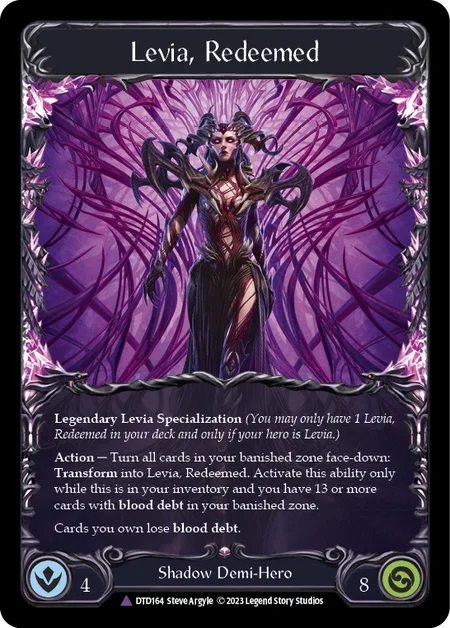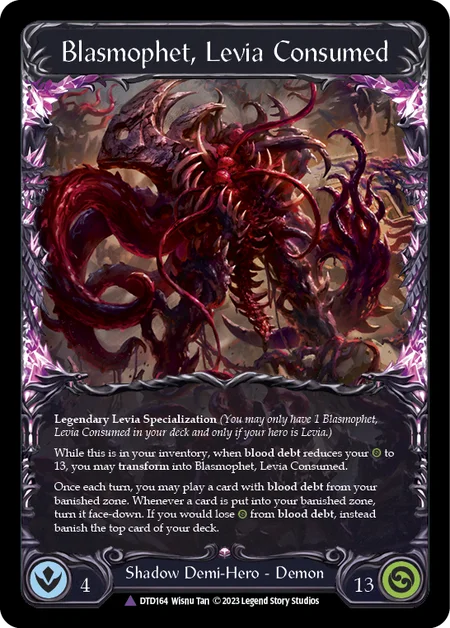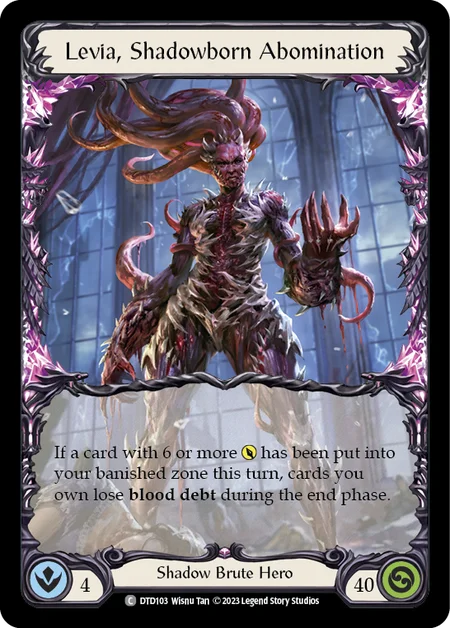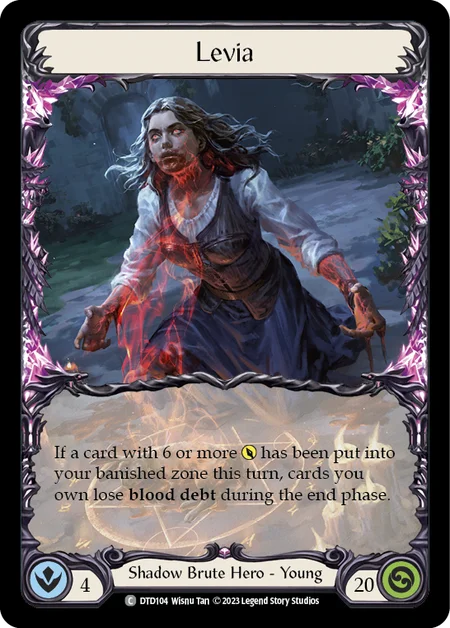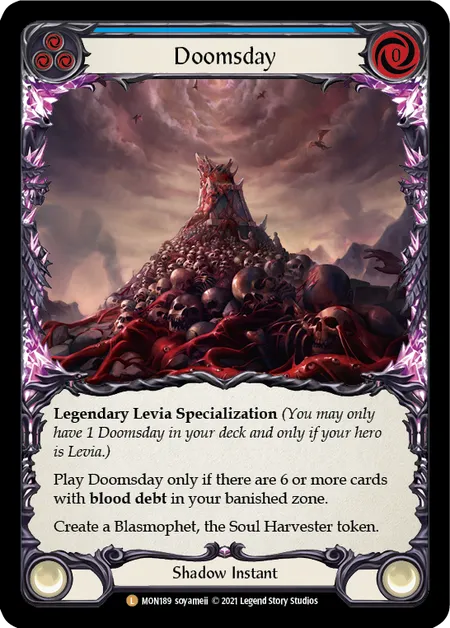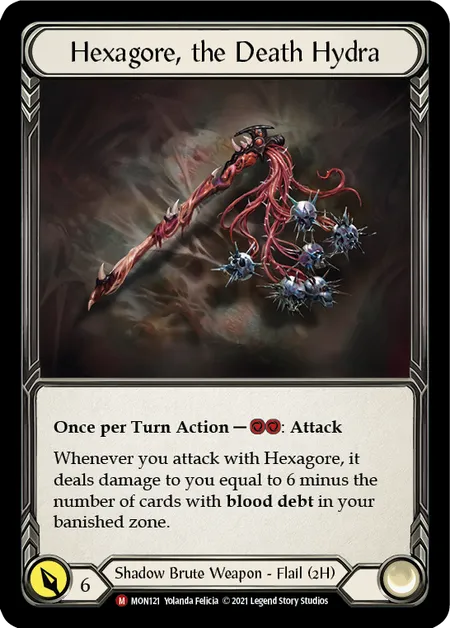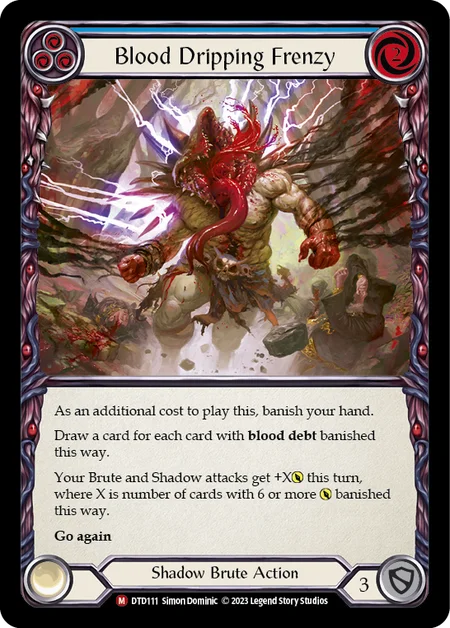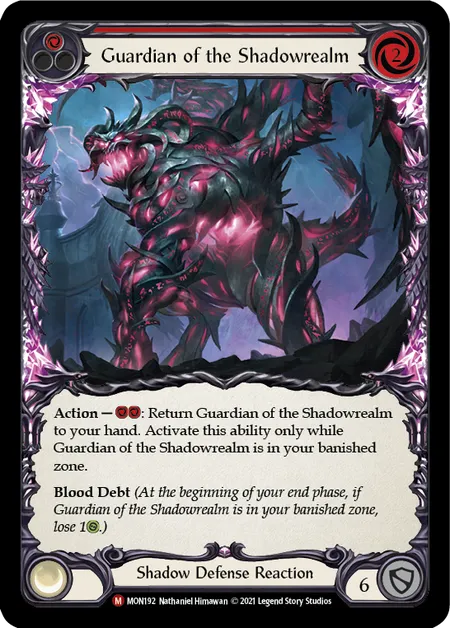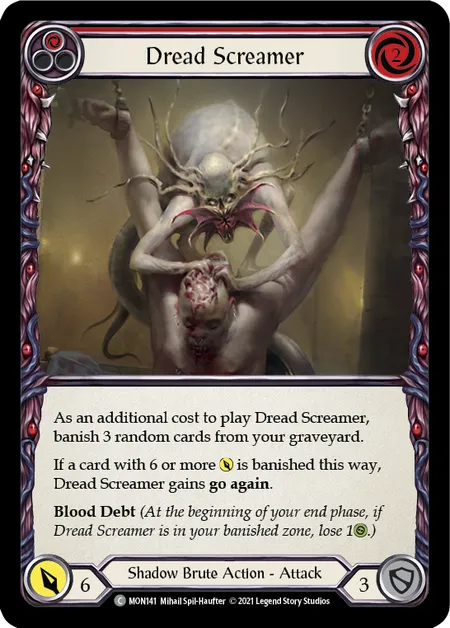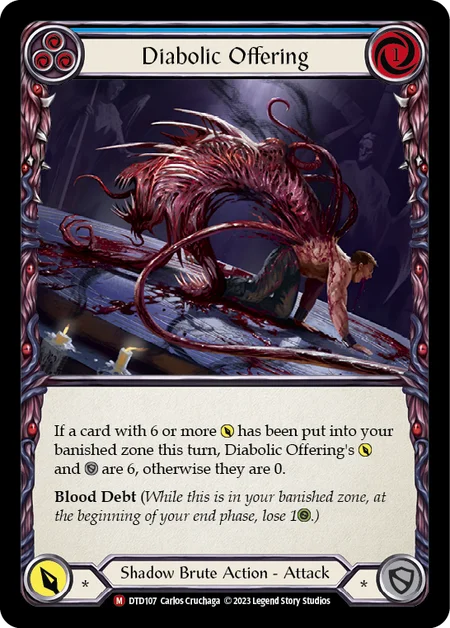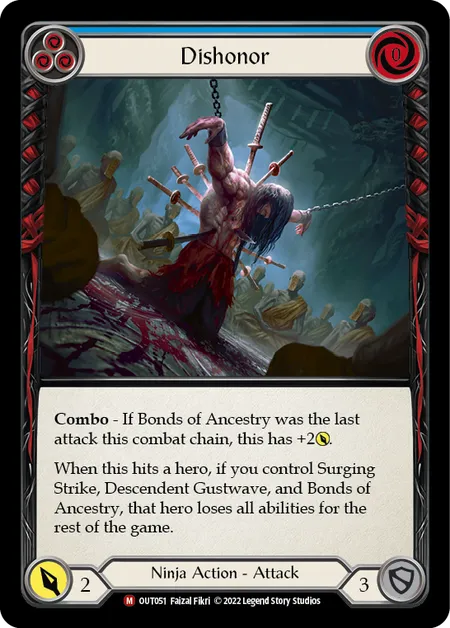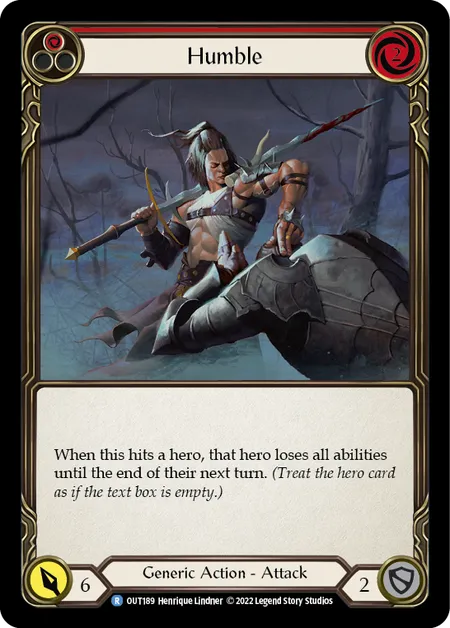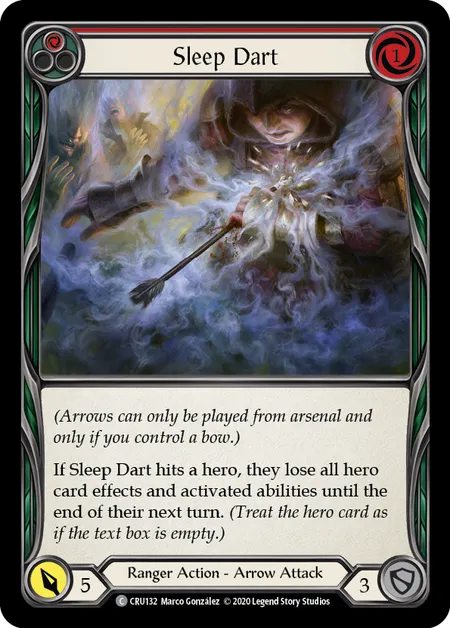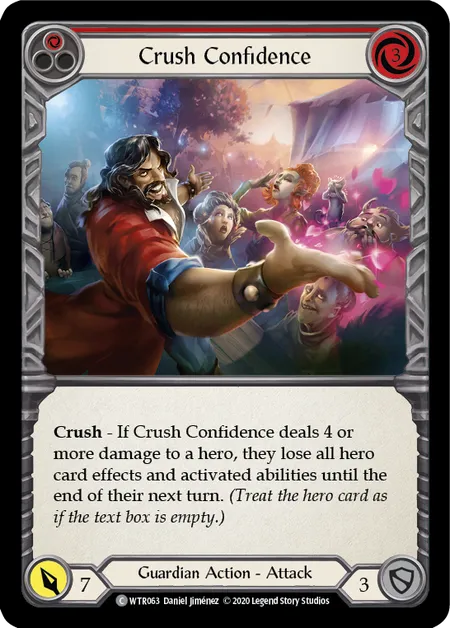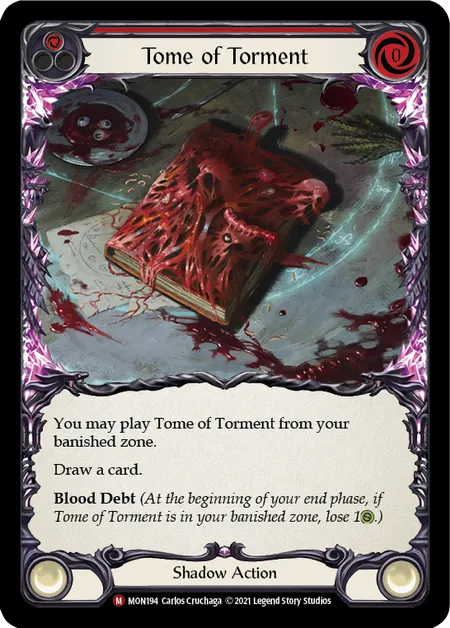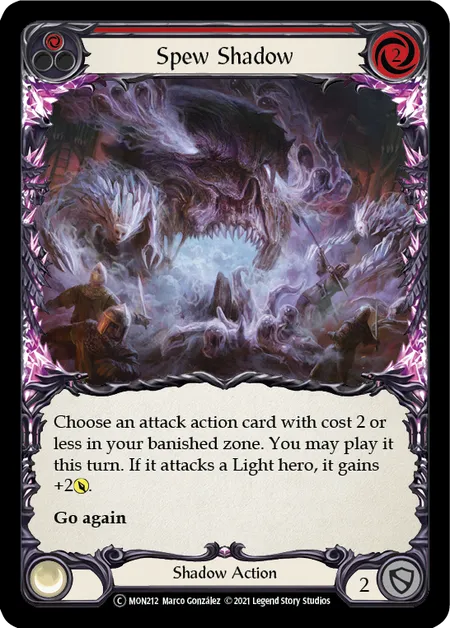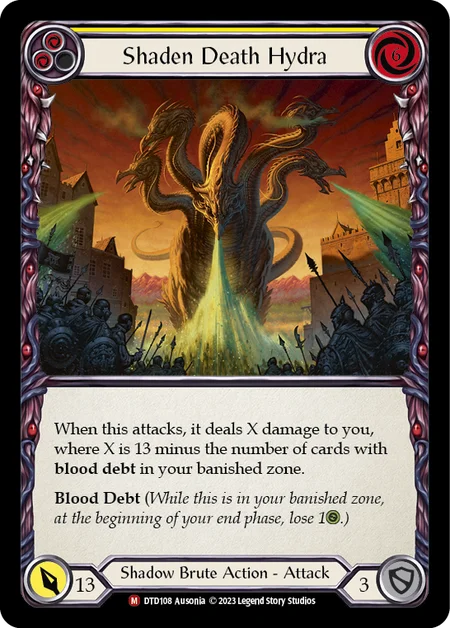Today, we delve deep into the Shadows... specifically the duality of a truly mesmerizing card that stands as a testament to both engaging gameplay mechanics and immersive storytelling: Levia, Redeemed // Blasmophet, Levia Consumed. This one-of-a-kind card embodies the ever-present struggle between redemption and corruption, as two contrasting aspects of Levia converge as a single card with many possibilities.
The official name of the card is “Levia, Redeemed // Blasmophet, Levia Consumed”, but for the sake of brevity, we’ll refer to the card as Levia//Blasmophet for the rest of this article.
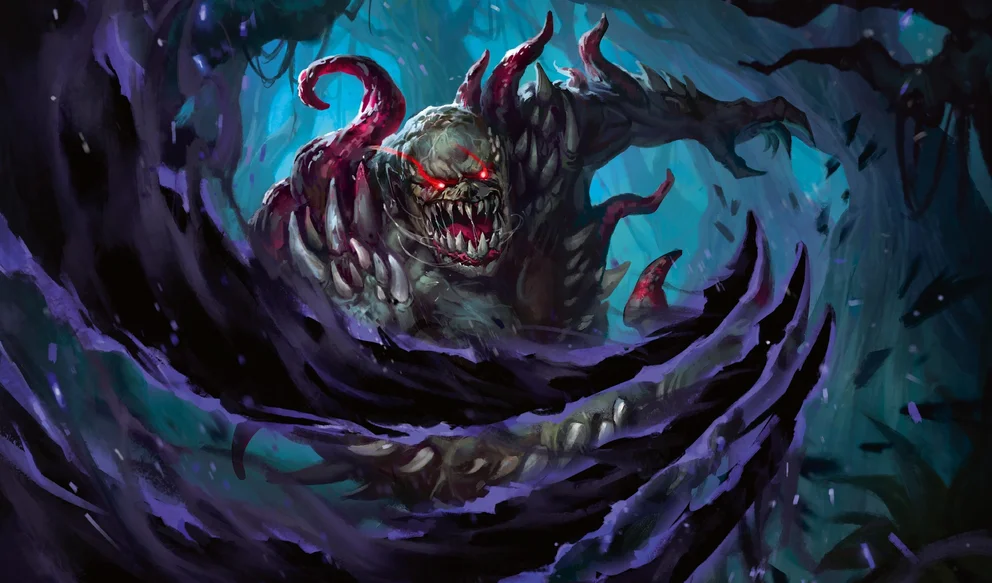
What is this card?
Levia//Blasmophet is a new double-faced card with Levia, Redeemed on one side, and Blasmophet, Levia Consumed, on the other side. Both sides have the type “Shadow Demi-Hero” and the text “Legendary Levia Specialization”.
Because this is a Legendary Levia Specialization, you can only include 1 of this card in your card-pool in any format, and only if your hero is Levia or Levia, Shadowborn Abomination (also Shiyana, but that’s always an exception with specializations).
Being a Demi-Hero card (a brand new card type), it does not start the game in your main deck, and you can not start the game with this as your hero. However, if you transform into one of the sides of this card, it replaces and becomes your hero for the remainder of the game.
Is Levia//Blasmophet legal in Blitz?
Yes. Levia//Blasmophet is a legal card to include in your Blitz card-pool.
Under the current rules (as of writing), you can have 1 young hero, and 51 cards in your card-pool which must consist of exactly 40 deck-cards and up to 11 arena-cards. Deck-cards are simply cards that can start in your main deck: actions, instants, reactions, resources, etc, while arena-cards essentially cover everything else: equipment, weapons, and demi-heroes.
(It is worth noting that upcoming Skirmish Season 7 Blitz events will use special deck-building requirements: 1 young hero, and 52 cards in your card-pool which must consist of at least 40 deck-cards, and up to 12 cards that can be either deck-cards or arena-cards. You can learn more about this here)
When you play a game of Flesh and Blood, the cards in your card-pool that didn’t start the game with are considered your inventory. Levia//Blasmophet is an arena-card, so it can be included as part of the 11 arena-cards in your card-pool, and because you can’t start the game with it as your hero, it will always start the game as part of your inventory.
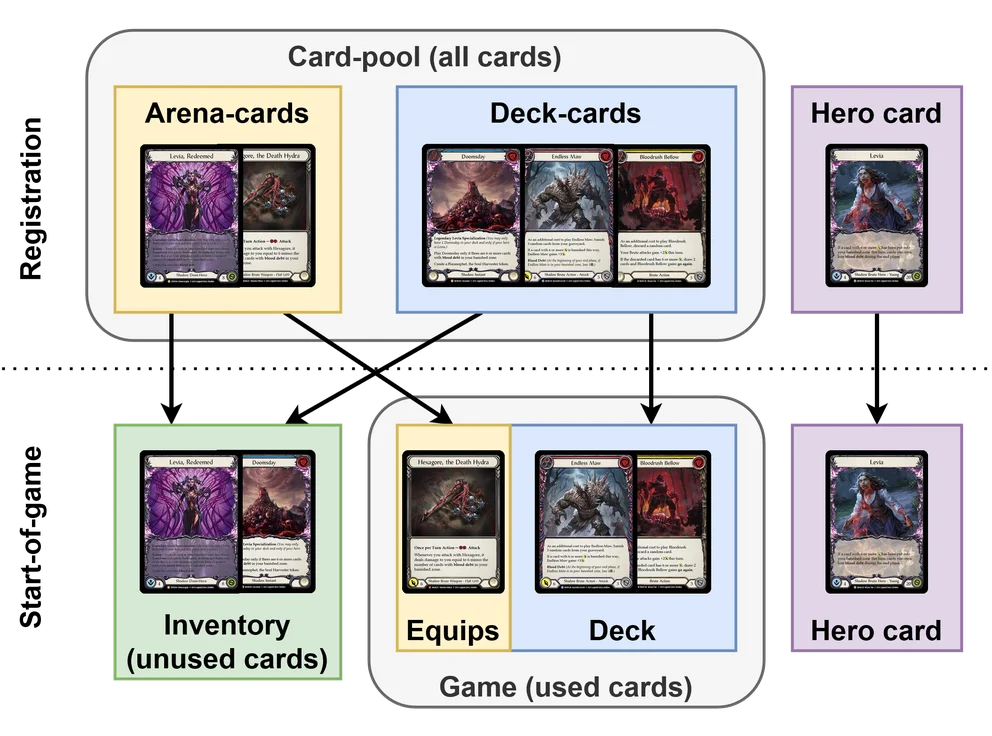
Do I have to choose the mode I’m going to use when I register it?
No. Levia//Blasmophet is considered a single card, with two faces. You register the card as a whole, then you may choose during the game which face of it you will transform into.
The primary idea is that both of Levia//Blasmophet’s faces are active while it is in your inventory. When you transform into either Levia or Blasmophet, the card enters the game, and only the face that you’ve transformed into is active.
When registering this card in your card-pool, you’re advised to write out the full name “Levia, Redeemed // Blasmophet, Levia Consumed”, but there is some allowance for variation as long as what you’ve recorded unambiguously refers to this card (and can’t be interpreted as another card).
Transforming into Levia, Redeemed
Transforming into Levia, Redeemed is relatively straightforward. First, Levia//Blasmophet must be in your inventory. Second, you need to have 13 or more cards with blood debt in your banished zone (face-up). Third and finally, you activate the action ability by revealing Levia//Blasmophet from your inventory, and turning all of the cards currently in your banished zone face-down as part of its cost.
When you transform into Levia, Redeemed, your current hero goes underneath Levia, Redeemed (i.e. it becomes a card in your hero’s soul) and Levia, Redeemed becomes your hero for the remainder of the game. Your life total is reset to 8, regardless of what your life was before. After the transformation, Levia has only one relevant ability, detailed below:
Cards you own lose blood debt.
As Levia, Redeemed, you have a single ability that removes blood debt from all of the cards that you own. This includes the cards in any zone, and not just your banished zone. While this does remove the threat of losing the game due to blood debt, it also limits the effectiveness of some Shadow Brute cards.
Transforming into Blasmophet, Levia Consumed
Transforming into Blasmophet, Levia Consumed is a little more complicated. First, you need to have one or more cards with blood debt in your banished zone. Second, at the end of your turn, blood debt needs to trigger and resolve, bringing your life total to 13. Third and finally, you trigger the transformation by revealing Levia//Blasmophet from your inventory.
One of the most important interactions to note here is that if you have two or more cards with blood debt face-up in your banished zone, each of those cards create a single triggered-layer which resolve one at a time. This means if you’re at 14 life, and you have three cards with blood debt in your banished zone, you can resolve a single blood debt trigger, then transform into Blasmophet, Levia Consumed, then finally resolve the remaining two blood debt triggers.
When you transform into Blasmophet, Levia Consumed, your current hero goes underneath Blasmophet and Blasmophet becomes your hero for the remainder of the game. Your life total remains at 13. After the transformation, Blasmophet has three separate abilities, which we will break down one-by-one.
Once each turn, you may play a card with blood debt from your banished zone.
This ability allows you to play a single face-up card with blood debt from your banished zone. You can even use this on your opponent’s turn, such as playing Guardian of the Shadowrealm during the reaction step. If the card may be played from the banished zone through another effect or ability (such as an ability on itself that says “you may play this from your banished zone”), it does not consume this once each turn ability.
Whenever a card is put into your banished zone, turn it face-down.
This ability simply turns any card banished to be face-down. What is important to note here is that it’s a triggered ability, meaning that the card is first banished (typically face-up) and then turned face-down. This is relevant for cards that depend on having banished a 6+ power card, like Dread Screamer.
If you would lose life from blood debt, instead banish the top card of your deck.
This ability simply changes blood debt life loss into banishing cards from the top of your deck. After you transform into Blasmophet, any remaining blood debt triggers that need to resolve that turn would be affected by this and instead of taking the remainder of blood debt life loss, you just banish that many cards from the top of your deck. Because of the previous ability, the banished card(s) is then turned face-down.
What happens if you’ve been dishonored?
Dishonor’s on-hit effect is a one-of-a-kind continuous effect that lasts for the entire game. However, like many other effects, it specifically applies to a hero, not a player.
If your Levia hero has been dishonored (and has lost their abilities for the rest of the game), when you transform, you become a brand new demi-hero and effects that applied specifically to the original Levia you transformed from, do NOT transfer onto your new demi-hero, i.e. your new demi-hero will not be dishonored (although how much honor they had to begin with is questionable). However, if your new demi-hero is dishonored after you transform, then you’re out of luck. Its abilities will be lost for the rest of the game, and for either Levia, Redeemed, or Blasmophet, Levia Consumed, that might just mean game over.
What does a face-down card in banished mean?
Banishing a card face-down is like a “super banish”.
In all seriousness though, cards that are banished face-down have an extremely limited amount of interaction with the game. Abilities that trigger or allow you to play a card from the banished zone are non-functional with face-down cards unless they explicitly specify “face-down” in the banished zone. Effects that target or allow you to choose a card in a banished zone also can not apply to face-down cards unless the effect explicitly specifies “face-down”. In addition, effects that care about the properties of cards in your banished zone ignore the cards that are face-down.
This essentially turns cards that are banished face-down into “dead cards”. For Levia//Blasmophet in particular, if many of your blood debt cards are turned face-down, you may lose the chance to play certain cards, or lose synergy with Shadow Brute cards. Even Blasmophet, Levia Consumed’s ability would not allow you to play a face-down card with blood debt from the banished zone.
For more information on specific cards, interactions, and rulings in Dusk till Dawn, check out the release notes.
